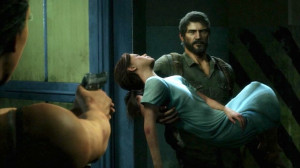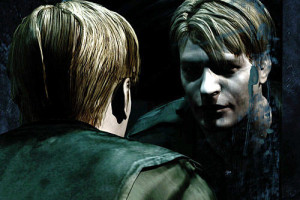Gaming Empathy
by ted2112, HSM team writer
I love killing zombies! There is nothing like that perfect headshot that takes those groaning, foot dragging, human suits of undead down. I have mastered waiting until the last second to get them up close in some kind of line, pulling the trigger on my shotgun with a smile, and bang-o! Taking a whole group down. I also love killing monsters! There are all kinds of mutant, freaky things that run from traditional monsters to downright bizarre.
Games like Resident Evil, Silent Hill and Siren make my day. I shoot away with a clear conscious because, hey, they’re dead already, right? Heck, I’m doing them a favor. However, games like Tomb Raider and Last of Us have unnerved me.
Why? The enemy is human.
I am a pacifist at heart. It’s no fun for me to hurt people; life’s too short. I’m not exactly military material either (the only gun I own is a super soaker), but when it come to video games, I can fully customize any weapon a console can throw at me. I guess you could say I’m a hypocrite.
I have been putting off and putting off playing Grand Theft Auto V for months now. Something about it has stopped me. I have played and thoroughly enjoyed the entire series, my favorite being San Andreas. Maybe it’s the graphics that have gotten a little too realistic. Or maybe it’s because the game is getting a little to close to real life. I’m not 100% sure; all I know is I have read all the rave reviews and seen my friend list light up with most playing the game and I still have been dragging my feet.
 Playing The Last of Us was a amazing experience for me. The mutant zombies in the game were a blast to dispatch to great beyond, but the human characters were difficult at best to shoot for me. The game deliberately put you in a moral situations and at the end of the game that you had to make a powerful choice. I love how Naughty Dog made you really think about right and wrong and the value of a single human life. This game never glorified killing at any time – in fact it made it ugly, yet there you were, killing wholesale. The game seemed to find that empathetic balance never quite reached until then.
Playing The Last of Us was a amazing experience for me. The mutant zombies in the game were a blast to dispatch to great beyond, but the human characters were difficult at best to shoot for me. The game deliberately put you in a moral situations and at the end of the game that you had to make a powerful choice. I love how Naughty Dog made you really think about right and wrong and the value of a single human life. This game never glorified killing at any time – in fact it made it ugly, yet there you were, killing wholesale. The game seemed to find that empathetic balance never quite reached until then.
Tomb Raider was similar, but Square Enix chose to portray the bad guys as so incredibly bad that you had to kill them. You were a public servant standing up for good, friendship, scientific research and woman’s rights, and you were hell bent on survival and cleansing the world of these vermin. This dynamic made it much easier to shoot these bad humans in the game.
First-person shooters are entirely a different ball game for me. Instead of a character, the view is from your eyes as you look for other humans to kill, especially the on-line modes where the object is nothing other than to kill for recreation’s sake. When I bought my second PlayStation 3 it came with Call of Duty Black Ops thrown in for free. I decided to try it one boring night against my better judgment, and lasted about fifteen minutes. I just couldn’t do it. There was something too personal about first person shooters for me. Anyway, that was that for me. If anyone wants the game let me know; it’s yours.
There is this really great and funny scene in the Jay and Silent Bob movie Clerks when they are debating justifiable violence and whether the rebellion was justified in blowing up the not-yet-completed Death Star in Return of the Jedi:
“All those innocent contractors hired to do a job were killed – casualties of a war they had nothing to do with. All right, look – you’re a roofer, and some juicy government contract comes your way; you got the wife and kids and the two-story in suburbia – this is a government contract, which means all sorts of benefits. All of a sudden these left-wing militants blast you with lasers and wipe out everyone within a three-mile radius. You didn’t ask for that. You have no personal politics. You’re just trying to scrape out a living.”
The first-person shooter changes the focus from some character you are playing doing the shooting, to you doing the shooting. And like Jay and Silent Bob said, there will be unjustified casualties. Now, of course, Return of the Jedi was a movie and not real. Call of Duty Black Ops is just a video game and you’re not really a special forces soldier, but what is it about these games that draw us to them?
Do we just like killing? Is it something in our DNA? That playing these games satisfies an ancient bloodlust?
Let’s face it: we are a violent society.
That being the case, are these game good in the way they safely channel that violence? We know it’s not real. Or do they glorify killing, make it more socially acceptable and keep pushing that boundary further out? This has been a debate that has been going on since there has been art in any form.
I feel it’s about empathy. Some of us have it, some not so much. Vegetarians can’t eat meat because to them the ‘why’ is as important as the ‘what.’ Pet lovers have been known to take better care of their animals than themselves. To tree lovers, the forest is as real and alive as any human place. I could go on and on, but some level of empathy is in us all — whether we recycle, refuse to give money to corporations we know use exploited labor, or leave a good tip in a restaurant. We don’t have to, but it’s that empathy that drives these decisions and video games are no exception.
 The one thing I have found: the older I get, the less I like violent video games. Maybe it’s because I am older and wiser or maybe it’s because I have seen violence and know there is no glory in it. You don’t get cheat codes or sent to the continue screen when you’re shot. I do miss the over-the-top exaggerated gameplay of Grand Theft Auto; there is much about it that is fun, but I still haven’t made up my mind about diving into the fifth installment.
The one thing I have found: the older I get, the less I like violent video games. Maybe it’s because I am older and wiser or maybe it’s because I have seen violence and know there is no glory in it. You don’t get cheat codes or sent to the continue screen when you’re shot. I do miss the over-the-top exaggerated gameplay of Grand Theft Auto; there is much about it that is fun, but I still haven’t made up my mind about diving into the fifth installment.
Until I figure out my own personal level of gaming empathy, I think I will re-play that wonderful reissue of Silent Hill 2 HD on Hard mode. You get a chainsaw. Look out, zombies!
Share
| Tweet |



 Twitter
Twitter
Ted, I wrote on what I believe are the evils of GTAV, and I am glad that you face the same moral questions of the ethics of realistic violence. Yes I too have slain hordes of the undead in the realm of God of War, but like you I dont see that as equal to the vileness of the type of mayhem of a GTAV. I feel all violence is bad and recently have seen my gaming shift to games like Journey, Flower and Gran Turismo. Games of beauty, art and skill. Yes, I will fall back into some games that may be violent, but deep down there will always be the feeling that I am doing something bad. I am an expert at the old PS2 game “Star Wars Battlefront II”.I killed near 100,000 stormtroopers and clones,because they were the evil Empire, but wow did I feel crumby when I accidentally killed innocent jawas. I suppose it’s good to feel this way.Great article.
I also usually have a hard time with shooters. I won’t buy GTA5 or any other game of its ilk, I just don’t seen the draw. Never played any of the war games, first person or otherwise, but I do like Borderlands which was a surprise for me. Of course in that game all of the people you kill are mutants or so depraved you can’t consider them human anymore really.
In games like FF14 you have to kill humans at times as well, though the bulk of what you kill is monsters. These humans are attacking your home though and leave you little choice to defend yourself as they attack you first in most cases.
The same is true of Skyrim and many other RPG titles.
I like to take breaks from all of them and play other types of games as well like puzzle games and Journey or Unfinished Swan. I am not sure what attracts us to games that require us to kill things, I think it has been a part of video gaming since it started so it has just become a part of what we expect to have to do.
Great article as always Ted, I always enjoy your outlook on things.
Violent games are difficult to asses, especially the ones you mentioned, Ted -- when developers first ventured into the FPS and RPG genres, we had games like Doom and the original Final Fantasy. Doom, for example, depicted a nameless soldier slogging through a hellish dimension populated by all sorts of demons you may encounter in Dungeons and Dragons (if more likely to carry firearms); it was brutal in scope, but something you don’t expect the average person to experience in real life. Cacodemons tend to be popular fantasy fodder, as they’re manifestations of malice and fright; Doom capitalized on that by making the player visit an actual hell, like a heavily armed Dante, wreaking havoc upon the forces of evil.
Now, the Final Fantasy series faced a different situation -- your primary antagonists were human, but you spent most of your time fighting random creatures that inhabit the world. The game may not give an in-universe explanation as to why every single creature you face is encountered through a battle; they simply exist as cannon fodder for the protagonists to level up, in order to take on the next boss. I can point to FFIV as a great example -- Kefka is one of the most effective villains in the franchise, and the story provides some great characterization on his part, so you know you had to take him down to save the planet. But what about the other living beings who share the same space as you? You’re looking at wolves, prehistoric creatures (such as the Cartarga) and even plans (such as the Rafflesia) -- probably due to their insignificance to the story, they’re nothing more than the stock “baddies” one must attack if you wish to level up.
That goes back to the Jay and Silent Bob quote you mentioned; fantasy RPGs offer quite a range of wildlife, but they unilaterally impede your progress, since they’re coded to simply be for the fight. We don’t really associate with them on a personal level, as they’re a dime a dozen -- there’s an odd sort of satisfaction in killing untold numbers of non-human animals, as if the empathy we share for fellow humans doesn’t extend to the rest of the animal kingdom.
If anything, games don’t quite reflect a violent society, at least not completely; the vast majority of us can identify good and bad ways of resolving situations, and games such as Call of Duty: Black Op and The Last of Us unnerve us precisely because they put the player in a very uncomfortable situation. The humans in these games aren’t physically corrupted by a virus (a la Resident Evil) or so monumentally evil that the world would be safer without their presence -- they’re presented as average humans who unfortunately happened to be on the “wrong” side of a video game. And that’s likely a major contributing factor; games simplify what would be very complicated international issues in real life, and the player navigates an environment wherein the primary objective is to shoot and move on (in the case of FPSes, anyway).
The moral dilemmas posed by recent games makes me think of how much gaming has changed. No longer can we expect a game to provide a simple narrative where you, the hero, fight through numerous underlings to reach the final boss and save the day -- a formula that made Mario games fun in their own right. But as the New Hollywood movement affected the presentation of protagonists, so did games such as The Last of Us; that “safety net” of the Good Fight against the Forces of Evil is thwarted by the real human cost of the experience.
That being said, I loved your article, Ted. I’d agree with your perspective on violence at the end -- growing older, we understand violence more, and it’s a terrible thing to inflict upon a society. Games that present a heavy dose of violent confrontation remind me of how films were like from the ‘6os onward; we’ve had films like the horror movies starring Peter Cushing, the Troma studios releases, RoboCop, Rambo, Bonnie and Clyde, The Wild Bunch, Taxi Driver and a host of others. The difference here is that you personally get involved in the storyline -- you’re the protagonist, wading through a sea of social insanity, but for what? Maybe there’s a slight nihilistic undertone to all this, what with how we treat NPCs that fight us, but that’s the risk developers took when creating these games.
I think I am going to go get The Last of Us. These psychological elements to games like The Last of Us, and GTA V are new experiences for sure. And I have to agree. Shooting anything that moves gets old.
I can imagine the time factor in creating these games. It would be refreshing to see game developers create fresh new stories and try limiting themselves on how much hardcore violence is necessary to deliver a quality experience.
Great article Ted!
The Last of Us got me emotionally within the first 10mins of playing. Probably because I’m a father to a little girl that I love more than anything else this world could muster; and Naughty Dog know their audience. I totally understand the angle you’re coming at about pointless violence in games though. But GTA5’s population ain’t as human as they might first appear. Not that I’m in the habit of dishing out batterings or shootings to random people -- heh, ammo’s too expensive for that malarkey! But I’ll happily fill a generic enemy with lead as I go through the missions; they all look/move and sound the same anyways, not much different to a zombie in my opinion.
The only time I had serious trouble with GTA5’s violence was when going through the torture scene, something I just won’t be repeating. Bye bye 100% on GTA5!
FPSes I stopped playing a LONG time ago, not because of the violence either, just the basic fact it’s the same tired formula every time; go here, shoot that, walk through this map shooting, then shoot some other stuff etc etc.
I’ve always played with “my conscience” whenever I’m able. Games that actively punish the player for mindless violence have always been welcomed by me. Things like being “de-synchronised” for randomly killing innocents in Assassin’s Creed keeps the less involved player from making the game a senseless violent mess.
Another great article Ted, and another interesting comment section born from it. I wish we could go for a beer! lol